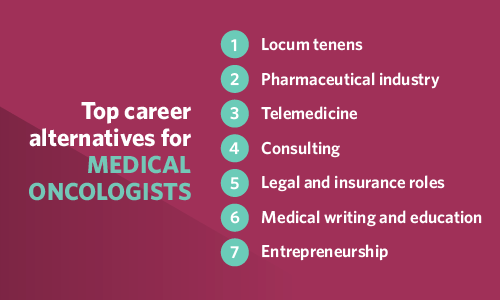7 career alternatives for medical oncologists
February 09, 2026
Medical oncology is not without challenges. As a physician, you deal with constant exposure to severe illness, grief, and loss, which can cause emotional exhaustion. Maybe you get frustrated when dealing with insurance and prior authorizations, or you feel you’re not heard when you have suggestions to improve patient care or efficiency.
Even with a shortage of oncologists and high demand for your specialty, you may want to make a change and use your skills and experience in other, non-traditional ways. Many options exist, including locum tenens. Here are seven career alternatives for medical oncologists to consider.

1. Locum Tenens
Many medical oncologists who try locum tenens work enjoy newfound freedom and experiences that enrich their careers and lives. Controlling your own schedule results in more flexibility, and if you love to travel, this is the way to do it while also doing the job you love.
For medical oncologist Dr. Elizabeth Connelly, traveling to different places and adapting to others' ways of doing things makes locum tenens a great choice. She also doesn’t have lengthy meetings or budgets to worry about. “All of the things that I did during my full-time work, I can let go of except for the part of taking care of patients, and that is amazing,” she says.
Dr. Sarah Ali was burned out and struggling to enjoy her work when she discovered locums. Now, she sees fewer patients and spends more time with them. “I was able to contribute so much more meaning within each 30-minute visit, and my patients appreciated that. I want to spend quality time, not be rushed,” she says.
One of the benefits of trying out locum tenens is that it’s not permanent. “You can try it, and if you don’t like it, you can quit. You know, give it a try and see if it fits you,” says Dr. Connelly.
Get the inside scoop: 8 reasons medical oncologists are choosing locum tenens work
2. Pharmaceutical industry roles
Pharma jobs for doctors are a perfect fit for many medical oncologists. Speaking to the Association of Cancer Care Centers, Sarah Hudson-DiSalle, Pharm.D., R. Ph., said, “I call some of my colleagues walking encyclopedias because they know so much about their subspecialized fields and how a drug would work best for a patient.”
“Oncology pharmacists represent a broad range of expertise and levels of practice, skills, and responsibilities,” said the Hematology/Oncology Pharmacy Association. They “are viewed as the ‘cancer medication experts’ who focus their time providing direct patient care, patient education, and actively participating in clinical decision-making in research and development.”
3. Telemedicine and remote work
There are also remote options for medical oncologists. Telehealth via telephone or videoconferencing is an option for physicians monitoring cancer treatment or long-term outcomes. When considering telemedicine jobs for oncologists, specific applications may include new patient consultations, medication prescribing and management, discussion of results, patient education on chemotherapy and other treatments, routine follow-up, and more. Opportunities also exist for remote patient monitoring.
“Telemedicine could expand the geographic reach of care, and data on the regulatory flexibilities adopted during the COVID-19 pandemic indicate that quality cancer research can be maintained with the use of such technologies,” confirms ASCO.
4. Consulting careers
You are already proficient in medical oncology, so why not bring that expertise to a consulting project? Your experience, combined with business strategy, can be well utilized by companies specializing in cancer care.
These might include healthcare systems, biotech firms, healthcare advisory firms, or drug development/pharmaceutical companies that hire medical science liaisons to support scientific education. Healthcare consulting for doctors can be a refreshing career alternative that offers growth and new learning experiences.

5. Legal and insurance-related roles
Physicians are also needed in law-related matters due to their medical expertise. By becoming a medical expert witness or consultant on cases involving oncology, you may be asked to review medical records, share your expert opinion, or testify in significant legal cases that involve your specialty.
You can also consider working as a policy advisor, whose recommendations help develop healthcare regulations within government or nonprofit advocacy organizations. Hospitals and healthcare systems need experts like you to advise about risk and compliance matters.
Insurance companies also need physicians, and your experience with complex cases is an asset when writing medical policies and assessing coverage denials, while upholding care standards promised to and expected by policyholders. You might review an insurer’s patient case documents to deem specific treatments and procedures medically necessary—or not. This can also apply to cancer patients’ eligibility for long-term disability insurance.
6. Medical writing and education
Medical writing and teaching opportunities abound for physicians, including medical oncologists. You can share your expertise by writing for academic publications or regulatory documents for clinical trials or clinical research organizations.
Pharmaceutical companies need written materials to support medication launches or create awareness around cancer. Research projects happen because grants fund them, and medical oncologists know the exacting details around how to word grant proposals. Patient education never ends, and the specificity of cancer education demands the medical oncologist's knowledge base. Medical writing jobs for doctors utilize many skills gained in medical school and in practice.
7. Entrepreneurship
The sky’s your limit, with new careers for medical oncologists that likely didn’t exist when you graduated with your M.D. There are many business opportunities just waiting to be explored or launched that require deep knowledge of cancer treatment.
For example, maybe you marvel at the innovation of the digital health Xploro young-patient information platform that began with children with cancer. You may have noticed CancerX, the public-private initiative that marries tech, healthcare, and the government to improve cancer care. Have you looked at companies like Encapsulate, a precision medicine startup developing advanced biochip systems, such as Metastasis-on-a-Chip? Don’t forget the ongoing emphasis on even more “smart” wearables for cancer patients.
Career options for oncologists
Are you hesitant yet excited to transition out of clinical practice and explore a new avenue in medical oncology? Take stock of your skill set and transferable skills. Think carefully about what your next list of priorities should be. Start to think about networking—you know a lot of people who can help—and lean on your associations and other professional organizations, not to mention your current and past employers, for recommendations.
Remember that you’re not just a “great medical oncologist.” There’s so much more to you than those three words, and you’re about to find out why you’re a perfect fit for opportunities you may never have imagined. It’s your move.
Interested in learning more about locum tenens as a career alternative for medical oncologists? Give us a call at 954.343.3050 or view today’s locum tenens medical oncology job opportunities.
